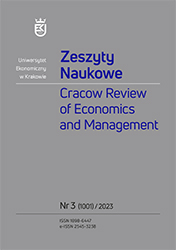Socially Responsible Innovations in Municipal Waste Management in the City of the Future
DOI:
https://doi.org/10.15678/ZNUEK.2023.1001.0307Keywords:
socially responsible innovations, municipal waste, waste management hierarchy, selective waste collection, waste generation indicatorsAbstract
Objective: To define, identify and evaluate socially responsible innovations of municipal waste management in the city.
Research Design & Methods: Socially responsible innovations were considered a condition and an opportunity to achieve municipal waste management goals and standards in cities. These include solutions that ensure a legally regulated, economically justified and socially acceptable hierarchy of waste management and, as a result, closing the material cycles in this economy. The theoretical background covers definitions of socially responsible innovations and the development of goals and standards in municipal waste management. The empirical basis comprises unpublished data on municipal waste management from a company working in Krakow and reports produced by the Mayor’s Office of the City of Krakow on the implementation of tasks in municipal waste management. Econometric (regression) and statistical methods for studying the dynamics of changes and the structure of the categories examined were used.
Findings: In the period under consideration, the Municipality of Krakow achieved the legally required levels of recycling and preparation for reuse and recovery of some fractions of municipal waste. The income of the municipal waste management system per capita has a positive and statistically significant impact on the levels of preparation for reuse, recycling and recovery that were achieved.
Implications / Recommendations: Innovative organisation and management as well as innovative methods of waste segregation and collection ensure that the goals and standards in municipal waste management will continue to be achieved.
Contribution: The article contributes new knowledge on improving the productivity and efficiency of municipal waste management, the use and implementation of the “polluter pays” principle and improving the effectiveness of integrated municipal waste management systems.
References
Canestrino R., Bonfanti A., Oliaee L. (2015), Cultural Insights of CSI: How Do Italian and Iranian Firms Differ?, „Journal of Innovation and Entrepreneurship”, vol. 4(1), https://doi.org/10.1186/s13731-015-0026-4.
Chełkowski M. (2022), Ocena skuteczności opłat za usługi gospodarowania odpadami komunalnymi, rozprawa doktorska napisana pod kierunkiem J. Famielec, Katedra Finansów Rozwoju Zrównoważonego, Uniwersytet Ekonomiczny w Krakowie, Kraków.
Communication from the Commission to the Council and to the Parliament on a Community Strategy for Waste Management, 18 September 1989, SEC (89) 934 final, 20.
Dionisio M., Vargas E.R. de (2020), Corporate Social Innovation: A Systematic Literature Review, „International Business Review”, vol. 29(2), https://doi.org/10.1016/j.ibusrev.2019.101641.
Dyrektywa Parlamentu Europejskiego i Rady 2008/98/WE z dnia 19 listopada 2008 r. w sprawie odpadów oraz uchylająca niektóre dyrektywy, Dz. Urz. UE L 312/3.
Dyrektywa Parlamentu Europejskiego i Rady (UE) 2018/851 z dnia 30 maja 2018 r. zmieniająca dyrektywę 2008/98/WE w sprawie odpadów, Dz.U.UE.L.2018.150.109.
Famielec J., Chełkowski M. (2022), Co powinna obejmować gospodarka obiegu zamkniętego i jak włączyć zarządzających nieruchomościami do jej funkcjonowania, Seminarium nt. Strategii gospodarki odpadami komunalnymi w gminie, Miejskie Przedsiębiorstwo Oczyszczania Sp. z o.o. w Krakowie, Wisła, 7–9 października.
Jayakumar T. (2017), Corporate Social Innovation: An Indian Moving Company Drives Industry Change, „Journal of Business Strategy”, vol. 38(6), https://doi.org/10.1108/JBS-10-2015-0107.
Kabaciński M., Podgórski S. (2022), Kierunki zmian gospodarki odpadami komunalnymi w UE. Nowa dyrektywa odpadowa, Seminarium nt. Strategii gospodarki odpadami komunalnymi w gminie, Miejskie Przedsiębiorstwo Oczyszczania Sp. z o.o. w Krakowie, Wisła, 7–9 października.
Kanter R.M. (1999), From Spare Change to Real Change: The Social Sector as Beta Site for Business Innovation, „Harvard Business Review”, May–June, https://hbr.org/1999/05/from-spare-change-to-real-change-the-social-sector-as-beta-site-for-business-innovation (data dostępu: 20.12.2021).
Kołcz E., Ziółko M. (2021), System gospodarki odpadami – ocena i analiza zadowolenia i świadomości mieszkańców Krakowa, „Zeszyty Naukowe Uniwersytetu Ekonomicznego w Krakowie”, nr 4(994), https://doi.org/10.15678/ZNUEK.2021.0994.0404.
Lis A., Sudolska A. (2018), W poszukiwaniu typologii innowacji społecznie odpowiedzialnych: mapowanie pola badawczego, „Studia i Prace Wydziału Nauk Ekonomicznych i Zarządzania”, nr 52/2, https://doi.org/10.3390/su11236553.
Mirvis P., Herrera M.E.B., Googins B., Albareda L. (2016), Corporate Social Innovation: How Firms Learn to Innovate for the Greater Good, „Journal of Business Research”, vol. 69(11), https://doi.org/10.1016/j.jbusres.2016.04.073.
Parto S., Loorbach D., Lansink A., Kemp R. (2007), Transitions and Institutional Change: The Case of the Dutch Waste Subsystem (w:) Industrial Innovation and Environmental Regulation: Developing Workable Solutions, red. S. Parto, B. Herbert-Copley, United Nations University Press.
Rozporządzenie Ministra Klimatu i Środowiska z dnia 10 maja 2021 r. w sprawie sposobu selektywnego zbierania wybranych frakcji odpadów, Dz.U. 2021 poz. 906.
Rozporządzenie Ministra Klimatu i Środowiska z dnia 3 sierpnia 2021 r. w sprawie sposobu obliczania poziomów przygotowania do ponownego użycia i recyklingu odpadów komunalnych, Dz.U. 2021 poz. 1530.
Uchwała Nr LII/697/12 Rady Miasta Krakowa z dnia 11 lipca 2012 r. w sprawie powierzenia Miejskiemu Przedsiębiorstwu Oczyszczania Sp. z o.o. w Krakowie obowiązkowego zadania własnego gminy utrzymania czystości i porządku na terytorium Gminy Miejskiej Kraków.
Ustawa z dnia 13 września 1996 r. o utrzymaniu czystości i porządku w gminach, t.j. Dz.U. 2022 poz. 2519.
Ustawa z dnia 1 lipca 2011 r. o zmianie ustawy o utrzymaniu czystości i porządku w gminach oraz niektórych innych ustaw, Dz.U. 2011 nr 152 poz. 897, ze zm.
Ustawa z dnia 14 grudnia 2012 r. o odpadach, t.j. Dz.U. 2022 poz. 699.
Van Ewijk S., Stegemann J.A. (2016), Limitations of the Waste Hierarchy for Achieving Absolute Reductions in Material Throughput, „Journal of Cleaner Production”, vol. 132, https://doi.org/10.1016/j.jclepro.2014.11.051.
Wąsowicz K., Famielec S., Chełkowski M. (2018), Gospodarka odpadami komunalnymi we współczesnych miastach, Fundacja Uniwersytetu Ekonomicznego w Krakowie, Kraków.
Downloads
Published
Issue
Section
License
Copyright (c) 2023 Zeszyty Naukowe Uniwersytetu Ekonomicznego w Krakowie / Cracow Review of Economics and Management

This work is licensed under a Creative Commons Attribution 4.0 International License.




